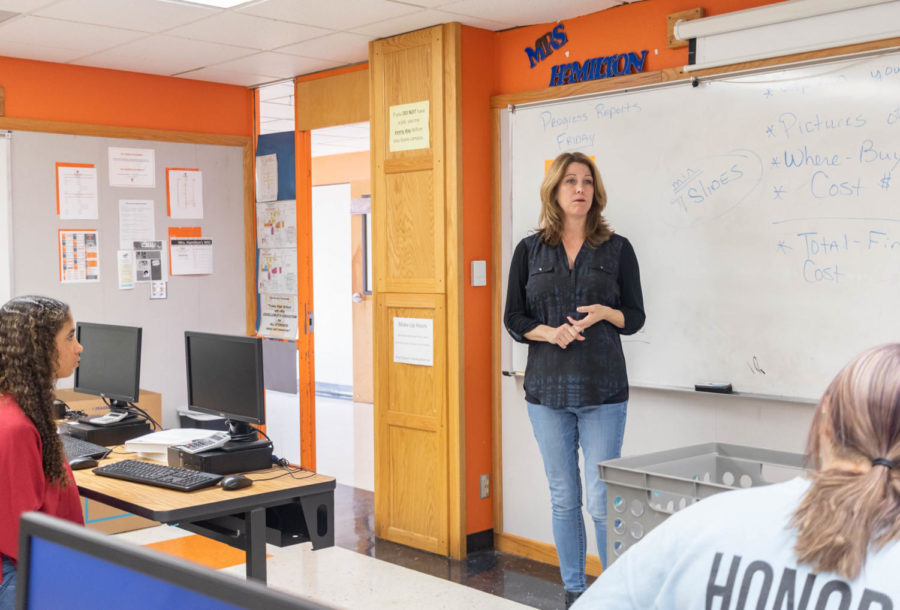Discovering DECA
Teacher Pam Hamilton gives insight on student organization
Photo by Sydney Rowe
Career and technology teacher Pamela Hamilton speaks to one of her classes. Hamilton was recently named Career and Technical Association Texas Area 3 Teacher of the Year
December 13, 2021
Distributive Education Clubs of America, aka DECA. Everyone’s heard the name. Everyone knows that if you’re in DECA, you might be dismissed early on work release. But that’s not all the organization does. DECA is an organization that allows its members to see and interact with the adult world they are going to enter soon.
“DECA is a nationwide organization that was formed in 1946. It was formed to help students that are interested in business, marketing and finance gain real-world skills through leadership and competition experiences,” DECA administrator Pam Hamilton said. “Students here at Texas High get the chance to attend leadership, a sports marketing seminar which includes attending a Mavericks game, [and] compete and run for office.”
Hamilton started her journey with DECA long before she began working at Texas High, but she picked up the mantle in her early days of working at the school.
“When I was hired, the only way a student could be in DECA was to take a marketing class, and I was the only marketing teacher at the time,” Hamilton said. “I had sponsored DECA at Queen City before coming to Texas High, so I just continued the club here.”
Nowadays, DECA is open to everyone willing to give it a chance, no prerequisite required, and Mrs. Hamilton delights in everyone having an equal opportunity to join her club. Mrs. Hamilton believes that DECA is a very good opportunity for students who have a potential future in business or finance.
“I think it is especially important for students to join that are planning on trying to apply to a business college such as McCombs or Mays Business School,” Hamilton said. “DECA is well known around the state and students will find that many students that get accepted participated in DECA.”
Mrs. Hamilton takes careful steps to recruit new high school students to her organization. Because it is such a helpful organization to those who want to go into the business field, Mrs. Hamilton makes her organization both fun and informative.
“I set up booths at the eighth grade orientation and club nights to try and attract new members. Some become interested when they hear their friends talk about their experiences and decide to join in the fun. I also try to recruit students from my accounting classes to be a part because they have the financial background needed for some of the events.”
DECA, as Mrs. Hamilton runs it, actually has two sections. There is the DECA club, where students go to competitions and meetings to further their business knowledge and skills. Students spend time preparing for their competition, and as they advance they get opportunities to travel and gain real-world experience.
“DECA Club [is where] students pay $20 dues and attend leadership and competition,” Hamilton “I have a DECA enrichment to allow students to not have to spend time outside of school preparing.”
The more commonly known part of DECA is the student worker’s program. This program allows students to both work and go to school at the same time while still gaining school credit for it.
“DECA [is when] students that have a job and would like to gain school credit for working sign up for Career Preparation,” Hamilton said. “This is a year-long class only — no, you can not get in at the semester — where students get to either leave school early or come to school late depending on their work and school needs.”
Depending on what classes a student takes or what time their jobs schedule them, a student chooses when is the best time for them to come in or leave school. Of course, a student still has to meet all their classroom requirements and graduation requirements to be able to be a part of the Career Prep program.
“[For example, a] student plays soccer and has a job,” Hamilton said. “They leave school at 1:20 p.m. daily, giving them time to get homework done, take a nap, etc. before going to work that evening. [Or a] student works early in the morning. They arrive at 9:45 a.m. every day allowing them time to work before coming to school.”
But students can’t just say they have a job and skip out of school. They must provide proof of employment and prove they’ve worked a certain number of hours before they can get the school credit. But as long as they provide proof, students can get full credit just from working their job.
“All students must work at least 15 hours a week,” Hamilton said. “I have a DC version for students that want a higher weighted GPA.”
Both the idea behind both versions of DECA and what Mrs. Hamilton works towards is preparing her students for the real world and what they want to do in the future.
“The idea is to prepare the next generation to be academically prepared, community-orientated [and] recognize the service and responsibility to the community, professionally responsible [and] learn how to speak and dress professionally, and experienced leaders [with] training provided,” Hamilton said.
















